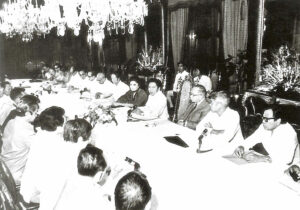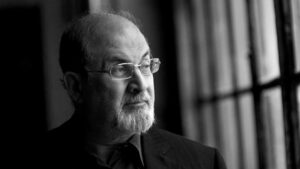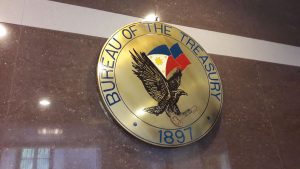A 70s Cabinet

In the 1970s, then President Ferdinand Marcos moved to create what was then perceived as a technocratic government, perhaps envisioning a “New Society” government run by “technical” experts more than politicians. He thus appointed to his Cabinet many specialists recognized in their respective fields, including known economic and management experts.
It is thus unsurprising that his son and namesake, president-elect Ferdinand Marcos, Jr., appears to now have the same tactic in mind. Perhaps in an attempt to help renew local and foreign investor confidence in the Philippines in this pandemic era, the president-elect will be joined in his incoming administration by technical experts, many of whom have public sector experience.
Senate President Pro Tempore Ralph G. Recto even referred to Mr. Marcos Jr.’s incoming economic team as “premium investment grade” as it consisted of highly regarded professionals who have “the vision to chart our progress and the virtues of hard work and honesty to grow our economy” in the post-COVID era.
“There is no better crew to oversee the drafting of [the] guide out of the economic doldrums inflicted by the pandemic than this A-team,” he added, referring to Benjamin Diokno (Finance), Arsenio Balisacan (the National Economic and Development Authority or NEDA), Alfredo Pascual (Trade and Industry), Mina Pangandaman (Budget) and Felipe Medalla (Bangko Sentral governor). Add to this list Bienvenido Laguesma (Labor).
All these professionals have served in the bureaucracy previously, in various capacities. Moreover, there is very little doubt as to their expertise in their respective fields as well as their professionalism. They all have impeccable and unquestionable academic and professional credentials and have remained untainted by political or personal scandals.
Incidentally, there are several ties that bind some of the appointees: their connection to the University of the Philippines (UP) School of Economics in Diliman, and their links to the Estrada Administration (1998-2001). In this line, perhaps if he had lived long enough, former Health Secretary Dr. Alberto “Quasi” del Gallego Romualdez, Jr. may have been reappointed to the Department of Health as well. Quasi was Health Secretary in 1998-2001.
But then, having been born in 1940, Quasi would have been 82 by now. And this brings me to my concern regarding the present economic team: it is a 70s Cabinet — incoming senior officials aged 70 and above. While I personally consider technical experts in their 70s just as competent and capable as those younger than them, stressful government work can take its physical toll on a person.
And, while one cannot discount these seniors’ intellectual prowess, wisdom, and experience, their physical well-being is just as important a factor to their capacity to do work. I am uncertain whether all of them will manage to finish their respective terms in 2028. Now, more than ever, there should be consistency and continuity in policy, management, and leadership.
Benjamin Estoista Diokno of Taal, Batangas was born in March 1948 and is now 74 years old. He was supposed to end his public service in 2023 as he finishes his term as governor of the Bangko Sentral ng Pilipinas (BSP). But, rejoining the Cabinet gave him a new lease on public life. Assuming he gets to complete his service as Secretary of Finance until the end of the Marcos II Administration in 2028, he will be 80 by the time he steps down from public service.
Prior to becoming Bangko Sentral governor, he was Budget Secretary during the Duterte and Estrada administrations, and Budget undersecretary during the Aquino I Administration. He started in government in 1986, more than 36 years ago. He is also a Professor Emeritus of the School of Economics of the University of the Philippines-Diliman. Mr. Diokno has been around long enough that his experience and institutional memory are not something to disregard. However, is he physically up to the challenge of staying in office until 2028? Is he actually looking at staying on beyond 2025?
Turning 74 years old this July is Alfredo Espinosa Pascual, who was also born in 1948. He is an international development banker and finance expert, and served as the 20th President of the University of the Philippines System from 2011 to 2017. He took up Chemistry at UP, and had taught at its College of Science for a while. He later worked for Procter & Gamble, Bancom Development Corp., Philippine Pacific Capital Corp., and First Metro Investment Corp. In 1989, he moved to the Asian Development Bank (ADB), where he stayed until his appointment as UP president in 2011.
Mr. Pascual’s experience in the private sector as well as ADB will serve him well at the Department of Trade and Industry starting on July 1. His stints at UP and the International Rice Research Institute (IRRI), and his involvement with FINEX and the Management Association of the Philippines, will be a major factor in forging future public-private partnerships.
Just a couple of years younger than Messrs. Diokno and Pascual is Felipe M. Medalla, who was born in 1950 and is now 72 years old. He was Socioeconomic Planning Secretary under President Estrada, and currently an incumbent member of the Monetary Board of the Bangko Sentral ng Pilipinas. He will assume the BSP governorship from Mr. Diokno, his contemporary at the University of the Philippines School of Economics, where Mr. Medalla used to be Dean.
Incoming Labor Secretary Bienvenido E. Laguesma was born in 1950 and is turning 70 this October. Laguesma finished his law degree in Ateneo de Manila University in 1975. He started working at the Ministry of Labor and Employment in the 1970s during the Marcos I Administration. He was Labor Undersecretary from 1990 to 1996, and then Labor Secretary from 1998 to 2001 during the Estrada Administration. He was also the commissioner of the Social Security System during the Aquino II Administration.
Lowering the average age of the economic team considerably is BSP Assistant Governor Amenah “Mina” Pangandaman, who is incoming Budget Secretary. Pangandaman holds a degree in Economics from the Far Eastern University, and a diploma and master’s degree in Development Economics from the University of the Philippines. She is also finishing her Executive Master of Public Administration from the London School of Economics. She was Budget undersecretary during the Duterte Administration. She also served as chief-of-staff to the late Senate President Edgardo Angara, who was Agriculture Secretary during the Estrada Administration.
But, the youngest among the seniors is Arsenio Molina Balisacan, who was born in Solsona, Ilocos Norte in November 1957. He will turn 65 this year, and will be 72 by the time the Marcos II Administration ends. Prior to his impending reappointment to NEDA by President Marcos Jr., he was the first head of the Philippine Competition Commission.
Mr. Balisacan is no stranger to government, having been Socioeconomic Planning Secretary during the Aquino II Administration, and Agriculture Undersecretary for Policy and Planning during the Estrada and Arroyo administrations. He is also a former professor and dean of School of Economics of the University of the Philippines Diliman.
Being the youngest senior in the economic team, I reckon Mr. Balisacan can stay in the Cabinet the longest among all of them. He is a marathon runner, after all. And this drives my point. The work the government faces now is not for sprinters but for long-distance runners. There is much to be done until 2028. And in this regard, I believe that age does matter.
Marvin Tort is a former managing editor of BusinessWorld, and a former chairman of the Philippine Press Council




